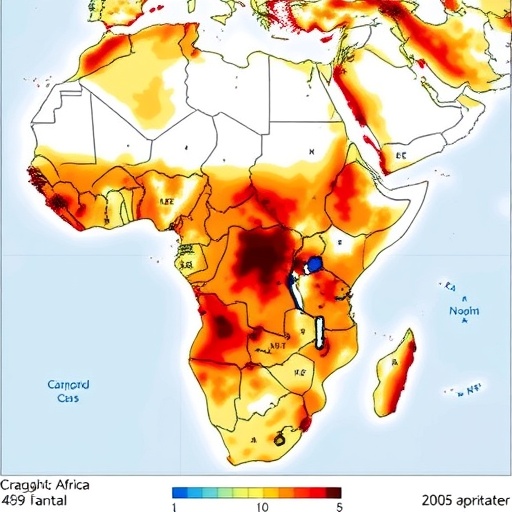In a groundbreaking study that could reshape our understanding of drought vulnerability across the African continent, researchers have integrated Geographic Information System (GIS) technology with a fuzzy logic framework and remotely sensed climate data. Conducted by a team led by Alasgah, A.A., the study provides a comprehensive assessment of drought risks affecting various ecosystems and communities throughout Africa. Drought, often considered a slow-onset disaster, poses significant challenges to food security, water availability, and biodiversity in the region. The confluence of climate variability and human activity exacerbates these dilemmas, thus demanding a sophisticated approach to assess and mitigate drought vulnerabilities effectively.
The use of GIS in this study allows researchers to spatially analyze drought patterns and trends over time. By effectively layering multiple data sets, including soil moisture levels, rainfall patterns, and temperature fluctuations, a clearer picture of drought severity across different geographic areas emerges. This method enables the identification of hotspots that are particularly susceptible to drought, guided by analyzing historical data and predicting future trends. Advanced remote sensing techniques facilitate real-time monitoring of changes in land use and climatic conditions, giving stakeholders the tools needed for proactive management strategies.
Fuzzy logic, though less commonly used, plays a critical role in this assessment framework. Traditional statistical methods often struggle to capture the complexities and uncertainties involved in ecological phenomena. In contrast, fuzzy logic provides a means to incorporate expert judgment and ambiguous data points, thus facilitating a more nuanced understanding of drought impacts. This approach acknowledges the variability inherent in climate data and enables decision-makers to tailor their responses according to specific conditions rather than relying on rigid, binary assessments.
The implications of this innovative research extend beyond purely academic interest. With Africa facing unprecedented challenges related to climate change, the outcomes of this study are particularly timely. As rainfall patterns become erratic and extreme weather events become more frequent, communities need actionable insights to prepare for and respond to drought scenarios. By presenting a framework that integrates multiple technological approaches, the research team has laid the groundwork for developing effective adaptation strategies at local, regional, and national levels.
One of the standout features of the research is its emphasis on vulnerability assessment, identifying not only the physical characteristics of drought but also the socioeconomic factors that compound these challenges. By examining demographic data, land usage, and economic activities, the study provides a holistic view of how dry conditions can exacerbate existing social inequalities. Vulnerable populations, particularly those dependent on agriculture for their livelihoods, are especially at risk, making this assessment not just an academic exercise but a vital tool for humanitarian planning and response.
Collaborating with local stakeholders has also been integral to this research. The researchers emphasize the importance of engaging with communities to input local knowledge into the framework, which enhances the reliability of predictions and recommendations. This collaborative approach fosters trust and empowers communities to take ownership of the drought management strategies identified through the research.
Additionally, the study highlights the importance of interdisciplinary collaboration in addressing complex problems such as drought vulnerability. By combining expertise from climatology, agriculture, social sciences, and technology, the researchers have created a model that transcends traditional disciplinary boundaries. This collaborative model paves the way for future research initiatives aimed at combating climate-related challenges, encouraging scientists and practitioners to work together to develop innovative solutions.
The findings of this research underscore the pressing need for policy responses based on sound science. As countries grapple with the realities of climate change, effective policy frameworks that incorporate the insights gained from this study are crucial. Policymakers can leverage the information from this integrated framework to develop targeted interventions, allocate resources efficiently, and enhance resilience against drought-related shocks.
Moreover, this research contributes to the global discourse on climate vulnerability and adaptation. By shedding light on Africa’s unique challenges, the study offers valuable lessons for other regions facing similar issues. As the world becomes increasingly interconnected, sharing knowledge and experiences gained from such research can foster international collaboration and collective action in the face of climate change.
The successful integration of GIS, fuzzy logic, and remote sensing in this research serves as a model for future studies aimed at understanding environmental challenges. It demonstrates the potential of technology to inform and enhance decision-making processes In circumstances where the stakes are high, such as in drought assessment, adopting innovative approaches is essential for ensuring that interventions are timely, relevant, and actionable.
In summary, the comprehensive framework developed through this research not only advances our understanding of drought vulnerability in Africa but also equips communities and policymakers with the tools necessary for effective adaptation. With climate change poised to intensify existing vulnerabilities, this study serves as a clarion call to prioritize innovative, science-based interventions that can mitigate the impacts of drought and foster resilience in affected populations.
Ultimately, the research conducted by Alasgah, A.A., Ahmad, I., and Dar, M.A. underscores the importance of interdisciplinary collaboration and community engagement in addressing the multifaceted challenges posed by climate variability and change. As the continent continues to confront the specter of drought, adapting strategies rooted in comprehensive scientific analysis will be paramount in safeguarding the livelihoods and well-being of millions.
Subject of Research: Drought Vulnerability Assessment in Africa
Article Title: Integrating GIS–Fuzzy logic framework and remotely sensed climate data for drought vulnerability assessment across Africa
Article References:
Alasgah, A.A., Ahmad, I., Dar, M.A. et al. Integrating GIS–Fuzzy logic framework and remotely sensed climate data for drought vulnerability assessment across Africa. Environ Monit Assess 197, 1110 (2025). https://doi.org/10.1007/s10661-025-14577-3
Image Credits: AI Generated
DOI:
Keywords: GIS, Fuzzy Logic, Drought, Vulnerability Assessment, Climate Change, Remote Sensing, Africa, Interdisciplinary Collaboration, Policy Response, Community Engagement




